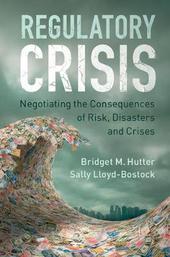
|
Regulatory Crisis: Negotiating the Consequences of Risk, Disasters and Crises
Hardback
Main Details
| Title |
Regulatory Crisis: Negotiating the Consequences of Risk, Disasters and Crises
|
| Authors and Contributors |
By (author) Bridget M. Hutter
|
|
By (author) Sally Lloyd-Bostock
|
| Physical Properties |
| Format:Hardback | | Pages:272 | | Dimensions(mm): Height 235,Width 157 |
|
| ISBN/Barcode |
9781107180444
|
| Classifications | Dewey:363.345610941 |
|---|
| Audience | | Professional & Vocational | |
|---|
| Illustrations |
Worked examples or Exercises; 8 Tables, black and white
|
|
Publishing Details |
| Publisher |
Cambridge University Press
|
| Imprint |
Cambridge University Press
|
| Publication Date |
11 May 2017 |
| Publication Country |
United Kingdom
|
Description
Using a new concept - 'regulatory crisis' - this book examines how major crises may or may not affect regulation. The authors provide a detailed analysis of selected well-known disasters, tracing multiple interwoven sources of influence and competing narratives shaping crises and their impact. Their findings challenge currently influential ideas about 'regulatory failure', 'risk society' and the process of learning from disasters. They argue that interpretations of and responses to disasters and crises are fluid, socially constructed, and open to multiple influences. Official sense-making can be too readily taken at face value. Failure to manage risks may not be central or even necessary for a regulatory crisis to emerge from a disaster; and the impacts for the regulator can take on a life detached from the precipitating disaster or crisis.
Author Biography
Bridget M. Hutter is Professor of Risk Regulation in the Department of Sociology, London School of Economics and Political Science. She is a leading authority on risk regulation and her book publications include Compliance (1997); Regulation and Risk (2001); Organizational Encounters with Risk (Cambridge, 2005); and Anticipating Risks and Organizing Regulation (Cambridge, 2010). Sally Lloyd-Bostock is Visiting Professor in the Department of Sociology at the London School of Economics and Political Science. She was Professor of Psychology and Law at the University of Birmingham and Director of the University's Institute of Judicial Administration. She is widely known for her influential work in psychology and law.
Reviews'This is a careful and nuanced account of regulatory crisis that is both illuminating and surprising. Hutter and Lloyd-Bostock show how regulatory crises can emerge, fester or fade through the complex interplay of events, institutions and individuals. Their analysis eschews a bland narrative in favour of richness of detail that provides the reader with a depth and authority of insight.' Fiona Haines, University of Melbourne, Australia 'All future scholars of disaster, natural or otherwise, will have to consult this wide-ranging comparative study of the complex and multiple forces that aim to ignore, remediate or exploit this crucial species of public troubles. I know of no work that matches it in terms of thorough documentation and range across so wide variety of cases.' Harvey Molotch, New York University 'Regulatory Crisis breaks new ground in understanding risk and regulation by showing how disasters and crises can become a crisis for regulators. Comparing five high-profile cases, the authors' novel approach uncovers how heretofore invisible organizational and political outcomes of a crisis unfold, affecting the mundane routines and understanding of individual regulators and at the same time, threatening the regulatory organization's legitimacy. A major achievement, the book's analysis and implications are highly relevant for scholars in disaster studies, risk and regulation, regulatory bodies and policy specialists.' Diane Vaughan, Columbia University, New York 'As someone who lived through the volcanic ash crisis, I found this book fascinating in its separation of the regulatory challenge involved in managing a serious risk and the subsequent crisis that can arise around the legitimacy of the regulator itself. In particular, I found the analysis of the drivers that often lie behind regulatory reform following a crisis illuminating and helpful. This book provides much insight and challenge for all those who have an interest in regulation, including politicians, businesses, the public and regulators and is a thoughtful contribution to the understanding of regulation and regulatory pressures.' Dame Deirdre Hutton, Chair, Civil Aviation Authority
|